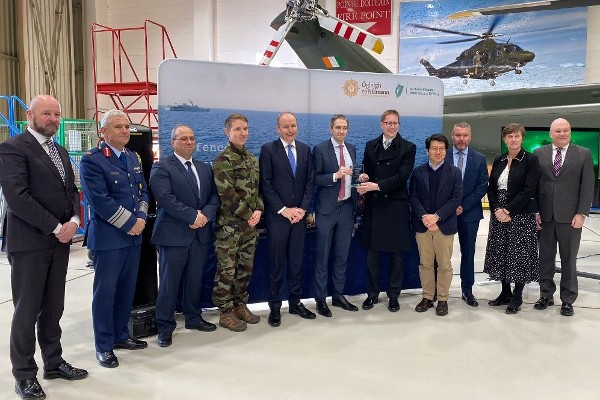
The MISTRAL Project Team consisting of Tyndall National Institute at Trinity College Dublin, the Irish Defence Forces and A-techSYN, has won half a million euro in the SFI-Defence Organisation Innovation Challenge.
Winners of the challenge were announced this week by Tánaiste and Minister for Foreign Affairs and Defence Micheál Martin TD, and the Minister for Further and Higher Education, Research, Innovation and Science, Simon Harris TD.

The MISTRAL project, led by Professor Holger Claussen of Tyndall National Institute, builds on the team’s previous DTIF Guard surveillance drone project in 2021, bringing its total research income with the Irish Defence forces to €7 million.
Tyndall's Mistral Project enabled the research team to work closely with Captain Ken Lyons from the Communications & Information Services Corps, and the Irish drone manufacturer A-techSYN. The MISTRAL Project proposed a new system for using drones to relay radio signals. The team showed that a small number of high-flying drones could ensure safe communications for Defence Forces operating in remote areas, including those on peacekeeping duties overseas.
Speaking about the project, Professor Holger Claussen said “Real-time access to information is one of the greatest force multipliers for the defence forces, and is vital for peacekeeping, emergency, or disaster response missions such as the earthquake disaster in Turkey and Syria. The MISTRAL project significantly improves communication capabilities through AI driven relay drones that automatically optimizes their location to maximize radio coverage for ground users. We have demonstrated that even with a single drone we can increase the VHF radio coverage area by 625 times compared to ground, based communication.
When the Mistral technology is fully developed, it can be used immediately after natural disasters similar to the Turkey and Syria earthquake, enabling quick communications, at a greater reach. This ensures emergency response, logistics, recovery, health and civil defence aids can activate rapidly, so the immediate impact on human lives is evident in these situations.”

Professor Claussen continued: “Reliable long-range communication is a universal challenge, and the MISTRAL system can also support communication for groups outside of the military domain. We will use the awarded funds to further develop our system to support additional communication functions, while engaging with stakeholders from emergency services, humanitarian groups, and communication hardware companies.”
The Department of Defence and the Defence Forces make up the Irish Defence Organisation. In 2021, they selected five challenges that needed solutions as well as leaving an open category for research teams to propose new ideas. The Innovation Challenge pioneered a new way of working, connecting research teams with members of the Defence Forces to embed with them and develop solutions to the challenges.
